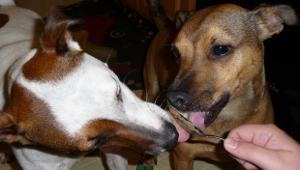Warning! Xylitol Now Found in Some Brands of Sugar-Free Peanut Butter
- posted: Jun. 16, 2015

Watch Out For the Artificial Sweetener Xylitol in Foods You Might Feed Your Dog
Most dogs love peanut butter. I know mine do! How often do we use it as a treat, put it into their Kong toys or use a dab of peanut butter to make it easier for a dog to take a pill? Regular peanut butters are fine for dogs in small amounts, but there is a new sugar-free brand of peanut butter called Nuts ‘n More on the market that you need to be aware of. Nuts ‘n More contains a sweetener called xylitol that is perfectly safe for people, but quite toxic to dogs. Xylitol is also found in many other sugar-free foods, most notably gum and candy. Here are some things you need to know about xylitol.
What is xylitol? Xylitol is sweet tasting alcohol extracted from birch wood.
Why is xylitol toxic to dogs? Xylitol is rapidly absorbed into the bloodstream from a dog’s stomach. It then causes a rapid release of insulin from the pancreas. This excessive release of insulin in turn causes the dog’s blood sugar to drop dangerously low. Hypoglycemia or low blood sugar can cause shaking, weakness and even seizures. This can happen within 1-12 hours of ingestion. In some cases, xylitol can also cause severe damage and death to a dog’s liver cells known as hepatic necrosis. This more serious side effect can cause liver failure and may be fatal.
How much xylitol is toxic? Dogs need to ingest surprisingly little xylitol—about 0.5grams/lb-- for it to be toxic. Eating 2 sticks of gum containing xylitol may be toxic to a 10lb dog.
What symptoms would I see if my pet has eaten xylitol? As stated above, dogs may vomit and may become weak, shaky, and disoriented. They may collapse or have seizures. Dogs who experience liver damage may have vomiting, loss of appetite, lethargy and other signs and may have trouble clotting their blood leading to internal bleeding.
Is xylitol toxic to cats? While cats may technically be affected by xylitol as well, they seem not to like the taste and there are no reports of toxicity in cats from the National Animal Poison Control. However, don’t tempt fate and keep xylitol products away from cats as well.
NOTE: Very low doses of xylitol are also sometimes found in dental products for pets like oral rinses or water additives since xylitol has anti-bacterial properties. The extremely low dose of xylitol in these products is considered to be safe if mixed and used properly according to package directions.
So, make sure you read labels and do not feed any foods containing xylitol to your pet. In fact, it may be best not to feed any food with artificial sweeteners or sugar substitutes. If your dog accidentally eats something with xylitol in it, get him or her to a veterinarian right away so proper treatment can begin.
This blog brought to you by the Patton Veterinary Hospital serving Red Lion, York and the surrounding areas.
Location
Patton Veterinary Hospital
425 E Broadway
Red Lion, PA 17356
